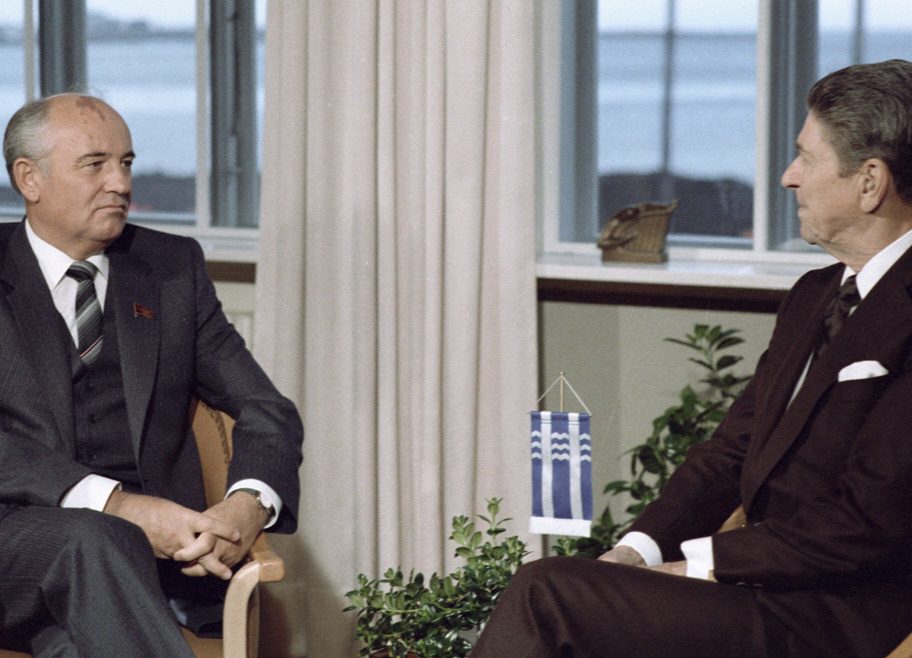
Mikhail Gorbachev, the Russian leader who helped put an end to the Cold War in 1991, has died aged 91. Per a report by Russian news agency TASS, the former Soviet president died in hospital after a “serious and prolonged illness.”
Gorbachev, while nearly unanimously praised by the West, has remained a controversial figure at home. His climb through the Communist Party’s ranks was slow yet steady. From 1985-1991, he headed the Politburo, the executive branch of the Party, then went on to assume the role of the first (and last) president of the USSR, a tenure which lasted from March 1990 to the end of December 1991.
With his implementation of a new policy grounded on glasnost (openness) and perestroika (reform), he is viewed as a stalwart reformer of the USSR bloc. In the process however, the USSR disintegrated in dramatic fashion, which left the former bloc in a chaotic state for years, plunging many of its former citizens into poverty in the process. It is for this reason that, to this day, he has had more than his fair share of detractors.
Gorbachev managed to distinguish himself from former USSR leaders by his handling of pro-democracy protests, which plagued various Eastern European countries of the Soviet Union in 1989. Instead of crushing these like previous Kremlin leaders had done—recall the tanks sent into Hungary in 1956 and then into Czechoslovakia in 1968—Gorbachev went a diplomatic route. Throughout, he made an earnest attempt at gradually introducing democratic reforms without endangering the USSR’s continuance.
Yet popular discontent could not be placated, which fuelled the resolve of 15 of the USSR’s republics in their collective quest for autonomy; over the next two years, from 1989 to 1991, the bloc disintegrated, a collapse Gorbachev could not avert. His decision not to use force to prevent the Berlin Wall’s fall, which brought about Germany’s reunification, he later claimed had averted World War III. For his trademark restraint, Gorbachev was awarded the Nobel Peace Prize in 1990.
Apart from his political achievements, he maintains global recognition for the distinctive birthmark—which in good jest was likened to a blotch of spilt wine—adorning his head.
Reactions from world leaders to his death are continuing to trickle in.
U.S. President Joe Biden called the Russian “a rare leader” who had created “a safer world.” His actions were those of a leader “who had the imagination to see that a different future was possible and the courage to risk his entire career to achieve it,” he said, adding that “the result was a safer world and more freedom for millions of people.”
A saddened British Prime Minister Boris Johnson also praised the legacy of the late Russian. “I have always admired the courage and integrity he showed in bringing the Cold War to a peaceful conclusion,” Johnson tweeted. “In a time of Putin’s aggression in Ukraine, his tireless commitment to opening up Soviet society remains an example to us all,” he added.
I'm saddened to hear of the death of Gorbachev.
— Boris Johnson (@BorisJohnson) August 30, 2022
I always admired the courage & integrity he showed in bringing the Cold War to a peaceful conclusion.
In a time of Putin’s aggression in Ukraine, his tireless commitment to opening up Soviet society remains an example to us all.
French President Emmanuel Macron equally paid tribute to Gorbachev, crediting him for having “changed our [Europe’s] common history.”
Mes condoléances pour la disparition de Mikhaïl Gorbatchev, homme de paix dont les choix ont ouvert un chemin de liberté aux Russes. Son engagement pour la paix en Europe a changé notre histoire commune.
— Emmanuel Macron (@EmmanuelMacron) August 30, 2022
EU chief Ursula von der Leyen called him “a trusted and respected leader,” saying that “he played a vital role in ending the Cold War and bringing down the Iron Curtain. That paved the way for a free Europe. His legacy is one that we will not forget,” she wrote on Twitter.
Mikhail Gorbachev was a trusted and respected leader. He played a crucial role to end the Cold War and bring down the Iron Curtain. It opened the way for a free Europe.
— Ursula von der Leyen (@vonderleyen) August 30, 2022
This legacy is one we will not forget.
R.I.P Mikhail Gorbachev
UN chief Antonio Guterres esteemed Gorbachev as “a unique statesman who has changed the course of history. He has done more than any other individual to bring the Cold War to a peaceful end.”
Mikhail Gorbachev was a one-of-a kind statesman who changed the course of history.
— António Guterres (@antonioguterres) August 30, 2022
The world has lost a towering global leader, committed multilateralist, and tireless advocate for peace.
I’m deeply saddened by his passing. pic.twitter.com/giu2RHSjrQ
Through a spokesman, Russian President Vladimir Putin expressed “deep sympathy” towards his predecessor’s friends and relatives. In a condolence telegram sent on Wednesday, he said Gorbachev had a “huge impact on the course of world history,” and that this last Soviet leader “deeply understood that reforms were necessary.”
